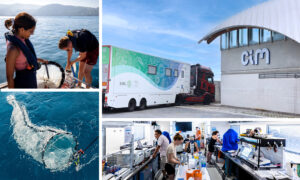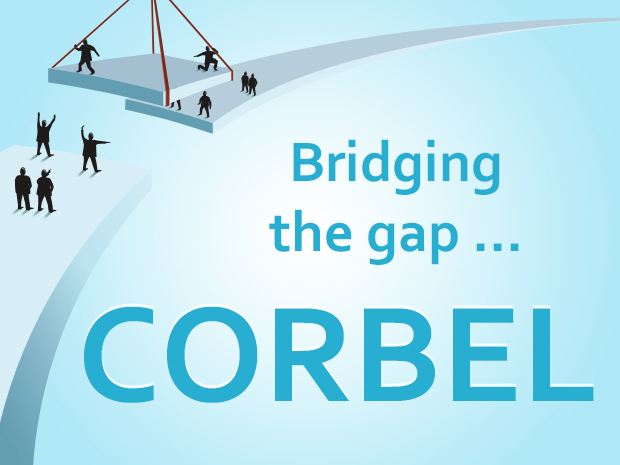
CORBEL: bridging research infrastructures
Major EU funding for ELIXIR will support efforts to facilitate access to data and biological imaging facilities for life-science research.

ELIXIR, the distributed infrastructure for life-science data, will coordinate a €14.5 million project over four years to establish and support a new model for biological and medical research in Europe by harmonising user access to resources, unifying data management and creating common ethical and legal services. ‘CORBEL’ (Coordinated Research Infrastructures Building Enduring Life-science services) will build on existing efforts to develop the tools, services and data management required by cutting-edge European research projects.
As a key participant, EMBL-EBI will work on implementing the necessary data standards, management, deposition and access to unite all of Europe’s life-science research infrastructures. This will benefit biologists and software developers alike, for example by providing consistent identifiers to biological samples so they can be mapped to relevant molecular and imaging data. The technical work in CORBEL will underpin progress in endeavours such as grid infrastructure, pharmacology infrastructure, biological and medical imaging infrastructure and translational medicine initiatives.
CORBEL will allow us to scale up and integrate our efforts.
“Our goal is to deliver and implement ‘best of breed’ interoperable standards so we can start to see these large-scale support structures begin to work together,” says Helen Parkinson, head of Samples, Phenotypes and Ontologies at EMBL-EBI. “This is incredibly important if we want to achieve both open data and access to secure data for life-science research. BioMedBridges allowed us to implement pilots across biomedical infrastructures; ELIXIR has done the same, and CORBEL will allow us to scale up and integrate our efforts.”
The data integration work in CORBEL will directly impact large-scale endeavours including EATRIS, Euro-BioImaging, EU-OPENSCREEN and INFRAFRONTIER, as the project relies on testing and feedback from these, enabling users to deliver high-quality results and ensure their adoption.
“We’ll be working within Europe’s infrastructure communities but also with academic and commercial users from IMI projects. We want to draw on input from the largest possible pool of users to ensure the shared services delivered by CORBEL are fit for purpose now and sustainable over the long term,” adds Parkinson.
Bridging structural biology and biological imaging
The convergence of cellular imaging and structural biology, supported by infrastructures such as Euro-BioImaging and INSTRUCT, will make it possible to understand in detail the molecular complexes that control cellular functions and, accordingly, find new ways to design medicines. But these two areas of science have developed very differently, and technical bridges must be created between them.
Within CORBEL, EMBL is working with Euro-BioImaging, INSTRUCT (structural biology), ISBE (systems biology) and ELIXIR to investigate cellular complexes and macromolecular machines using methods from the nano- to the micrometre scale (such as 3D information, super-resolution microscopy, and functional imaging). Data integration is the common thread. This will help Europe’s research infrastructures to open up their services to researchers throughout the scientific community.
“CORBEL provides us with the unique and timely opportunity to continue our work on data integration, and extend our efforts to harmonise physical user access across these essential research infrastructures,” says EMBL Head of Unit and Senior Scientist Jan Ellenberg. “This will open a new dimension of opportunities for cutting-edge research in Europe.”
The work in CORBEL will help us grow a truly innovative research environment in Europe.
“We were very pleased to learn that the EU is supporting this high-impact project, because there are so many excellent partners here who will be working to integrate their services. This means real value for researchers, who will find it easier to gain access to physical infrastructures,” says ELIXIR Director Niklas Blomberg. “Europe’s life scientists depend on access to biological and medical technologies, biological samples and the data services that bring them all together. The work in CORBEL will help us grow a truly innovative research environment in Europe.”
More about CORBEL
The ESFRI Biological and Medical Research Infrastructures (BMS RI) join scientific capabilities and shared services to transform the understanding of biological mechanisms and accelerate the translation of this knowledge into biological and health applications. The resources brought together by these infrastructures include physical biobank samples, imaging facilities and molecular screening centres. ‘CORBEL’ aims to create a joint platform that will visibly reduce redundancy and simplify project management, transforming the ability of users to deliver advanced, cross-disciplinary research in Europe.
CORBEL is coordinated by ELIXIR and its partners include: EMBL in Germany and EMBL-EBI in the UK; the European Clinical Research Infrastructure Network in France; InfraFrontier in Germany; Instruct Academic Services Ltd in the UK; the Biobanking and BioMolecular Resources Research Infrastructure (BBMRI) in Austria and EATRIS in the Netherlands (both ERIC infrastructures); the University of Dundee, University of Liverpool, University Of Manchester, University Court of the University of St Andrews, Imperial College of Science, Technology and Medicine and CAB International in the UK; Universitair Medisch Centrum Utrecht, Erasmus Universitair Medisch Centrum Rotterdam, Stichting VU-VUMC, Koninklijke Nederlandse Akademie Van Wetenschappen – Knaw and Academisch Ziekenhuis Groningen in the Netherlands; Fundacio Institut de Ciencies Fotoniques, Fundacio Centre de Regulacio Genomica and Agencia Estatal Consejo Superior de Investigaciones Cientificas in Spain; Idryma Iatroviologikon Ereunon Akademias Athinon in Greece; Istituto di Ricerche Farmacologiche Mario Negri, Consorzio Interuniversitario Risonanze Magnetiche di Metallo Proteine, Stazione Zoologica Anton Dohrn and Universita Degli Studi Di Torino in Italy; Heinrich-Heine-Universitaet Duesseldorf, Helmholtz Zentrum Muenchen Deutsches Forschungszentrum Fuer Gesundheit, Forschungsverbund Berlin, Max Delbrueck Centrum Fuer Molekulare Medizin, Deutsches Krebsforschungszentrum, Leibniz-Institut DSMZ-Deutsche Sammlung von Mikroorganismen und Zellkultur and Jacobs University Bremen in Germany; Centre National de la Recherche Scientifique in France; CSC-Tieteen Tietotekniikan Keskus Oy in Finalnd; and Medizinische Universitaet Wien in Austria.
This post was originally published on EMBL-EBI News.
Related links
- ELIXIR: the distributed infrastructure for life-science data
- EuroBioImaging: access to state-of-the-art imaging technologies for biological, molecular and medical research
- INSTRUCT: access to high-quality structural biology infrastructure
- BioMedBridges: Building data bridges from biology to medicine


